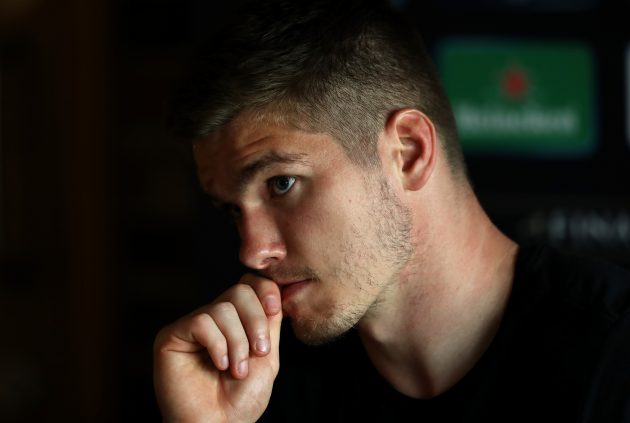Only 24, but already vastly experienced, Owen Farrell has evolved brilliantly this season and should have no insecurities about facing the world's best, in Dan Carter
By Alex Shaw
Reputations are hard to shed once they’ve been cast and in no arena do fans stick to these often outdated misconceptions more so than in rugby.
Since making his England debut in 2012, Owen Farrell has been an acquired taste for most rugby fans outside of England – as well as a significant portion inside, too. He was, even then, unfairly labelled as a player who could only kick goals and tickle ribs with his robust defence. The passion he played with, which often saw him shout in frustration or converse heatedly with the referee, was termed as petulance.
For those who derided Farrell with self-righteous pomposity, saying there was no place in rugby for that kind of behaviour, they probably don’t want to be reminded that Johnny Sexton, the most-celebrated of northern hemisphere fly-halves for the last five years, plays with that same level of passion that leads to on-field outbursts. Come to think of it, they probably don’t want to be reminded of Peter O’Mahony, Mike Brown, Tendai Mtawarira or Stephen Moore. The list goes on.

Creative spark: Farrell has added an attacking dimension to his play this season
Like all good rugby players who breakthrough into test rugby at a tender age, Farrell has evolved as the years have gone by. He has picked up 40 caps since his debut against Scotland and the man that now stands ready to take on Dan Carter and Racing 92, before packing his bags for Australia, is a vastly different to the one who helped England to a victory at Murrayfield that day.
Sure, he still plays with that same passion and defensive intensity that can see him barrack in frustration or put in a tackle that creeps a little too high, but those are minimal risks to absorb in order to accommodate a player who plays as hard as Farrell does, not to mention brings an unaccustomed relish for defending to the No 10 jersey. Farrell is clearly a far more cerebral and composed player now than he was four years ago.
Where Farrell’s evolution has really occurred, however, is in his attacking game. Where once you would see a deep back line, ready to receive telegraphed passes, you now see a staggered, scattering of options. His backline colleagues, whether that’s with Saracens or England, know that Farrell has a long and varied list of passes in his repertoire and they’re allowing him to direct the backline with assurance and guile.

Real deal: Dan Carter has proved his mettle in Europe this season
Flat passes on the gain line, Leinster-inspired wraparounds, cat-flap offloads, miss-passes over onrushing defences and a more than solid eye for a gap. Indeed, the attacking renaissance at Saracens is more attributable to Farrell more than any other individual. Since the British and Irish Lions tour in 2013, Farrell has been becoming a more adept attacking fly-half and the fruits of those labours have really paid off in the 2015/16 season.
Now Farrell faces one of the biggest challenges of his career to date, taking on Carter in the European Rugby Champions Cup final. Farrell and Saracens faced heartbreak two years ago when they took on the celebrated Jonny Wilkinson and Toulon, and now it’s the Kiwi who stands in the youngster’s way.
If Carter is the Superman of the rugby world, clean-cut and beyond reproach, then Farrell is, to many, much more like Wolverine. A darker anti-hero who the traditionalists can admonish, but who will then rush to heap praise on players who bring all the same qualities to the table as Farrell but who aren’t, well, Farrell.

Euro heartache: Farrell lost out in 2014, losing to Jonny Wilkinson’s Toulon
There is no sterner test for this new and improved Farrell than the one that Carter will bring on Saturday. Carter vied with Wilkinson for the title of the world’s best, prior to that it was Andrew Mehrtens, who took it from Michael Lynagh and so it goes on all the way back to the Welsh duo of Barry John and Phil Bennett. The question is, is this the beginning of Farrell’s march towards adding himself to that list? Contentious, yes, but not outlandish.
In fairness, there are no shortage of exquisite fly-halves currently plying their trade in world rugby. New Zealand is teeming with them, most notably Beauden Barrett and Aaron Cruden, although Lima Sopoaga is fast making up ground. Australia have Bernard Foley, Johnny Sexton is far from done in his career, whilst Carter still owns the title and even at 34, has shown very few signs of slowing down. Players such as Dan Biggar, George Ford and Handré Pollard also deserve mention, even if the last six months haven’t seen them at their most illustrious.

New world order: Aaron Cruden is one of a clutch of top-class 10s in the game
Farrell is scaling Mount Olympus, though, make no bones about that. He has the skillset, winners mentality and the physical robustness to be as good as he wants to be and he will be tested against the very best in the coming months at the European final, Aviva Premiership play-offs and tour of Australia. How he emerges from those tests will go a long way to deciding where Farrell currently sits in the pantheon of rugby’s current great fly-halves.





